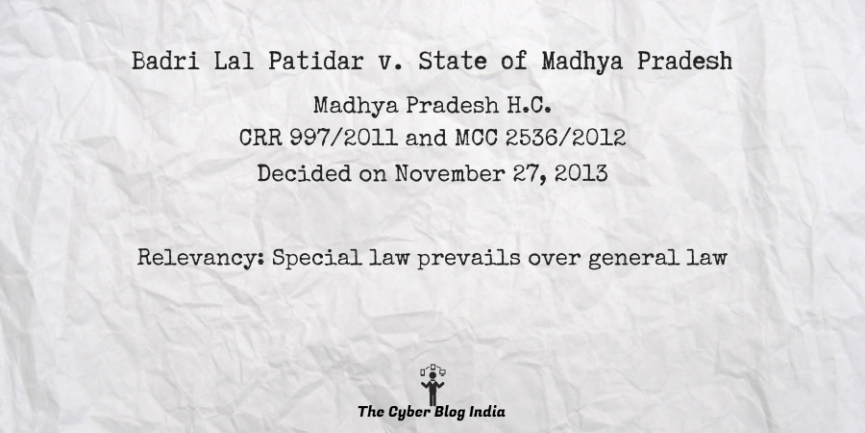Badri Lal Patidar v. State of Madhya Pradesh

Badri Lal Patidar v. State of Madhya Pradesh
In the High Court of Madhya Pradesh
CRR 997/2011 and MCC 2536/2012
Before Justice S.R. Waghmare
Decided on November 27, 2013
Relevancy of the case: Special law prevails over general law
Statutes & Provisions Involved
- The Information Technology Act, 2000 (Section 65, 66, 66D, 72)
- The Indian Penal Code, 1860 (Section 381, 408, 420, 467, 471)
Relevant Facts of the Case
- The petitioner is a civil and structural consultant/engineer. He worked in different industrial consultancy firms and also started a consultancy firm with the name Geo Struct Consultants.
- The complainant’s company is in the business of establishing Steel Plants. They have hired different engineers to convert designs into construction plants.
- The complainant outsourced the work to the petitioner and asked them to not commit to any other work. Therefore, upon the completion of the contractual tenure, the petitioner resumed his work in Geo Struct Consultants.
- While working for the complainants, it was alleged that the petitioner stole technologies along with the construction drawings from the office of the complainant. He marketed that on his website and claimed it to be his own drawings and technologies.
- The complainant filed an FIR against the petitioner under Section 381, 420, 467, 471 and 408 of the Indian Penal Code, 1860 r/w Section 65, 66, 66D and 72 of the Information Technology Act, 2000. The petitioner was arrested and his application for discharge was rejected.
- The petitioner challenged the rejection of the application and orders framed.
Prominent Arguments by the Advocates
The petitioner’s counsels:
- It was submitted that he was not given an opportunity to be heard and that he had responded to all the legal notices for placing the designs stolen from the complainant’s office. Also, before filing the final charge sheet it was not confirmed if the stolen property is copyrighted, patented, or trademarked. The police were not able to prove the same due to lack of knowledge and evidence. Still, the FIR was lodged. Since there was no registration of ownership over the designs, the author becomes the creator of the designs under Section 2(c)(i) and Section 17 of the Copyright Act and cannot be charged under provisions as referred in the FIR.
- Police seized the electronic documents of the petitioner in an illegal manner without following the due procedure and the electronic evidence can change hands at the time of seizure. The counsel further submitted that charges under forgery cannot be made with respect to the provisions of the Indian Penal Code, 1860 as the designs were created by him and do not amount to cheating.
- Sections 65, 66 and 72 of the Information Technology Act, 2000 cannot be used as the access to a computer was given by the complainant and for the allegations of using the design and trade Mark, the same does not flow from the IT Act.
The respondent’s counsel:
- The petitioner was appointed as a civil consultant. His job was to approve the designs and not create them. Therefore, he cannot be called the author of these designs. It was also submitted that provisions of the Indian Penal Code, 1860 as he stole the drawings while working for the company and subsequently utilized them on his website. This amounts to forgery, as given in Section 467.
Opinion of the Bench
- As the special law prevails over general law, the trial court may proceed with the Information Technology Act, 2000, the Copyright Act, 1957, and the Designs Act, 2000.
- The offence under Section 65, 66, 66(d) and 72 of the IT Act, 2000, Copyright, and Design Act will be considered by the prosecution. The entire proceedings, however, must be done by giving a proper opportunity to the petitioner regarding the framing of additional charges.
Final Decision
- The petitions are partly allowed.
